Items filtered by date: November 2023
The Importance of Treatment for Diabetic Foot Ulcers
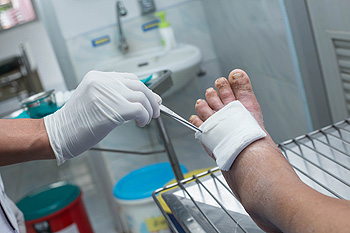
Diabetes can harm the nerves and blood vessels in your feet, reducing your ability to feel injuries. Minor foot problems like calluses, blisters, or cracks can develop into serious foot ulcers, often on the ball of the foot or under the big toe. These ulcers can become infected and lead to gangrene, potentially requiring the amputation of toes, parts of the foot, or even the leg. If you have a foot ulcer, it is vital to keep weight off the affected area to aid healing. For diabetics, early treatment of foot issues is crucial to prevent them from worsening. If you have diabetes, it is strongly suggested that you make routine appointments with a podiatrist to make sure your foot health is properly managed.
Wound care is an important part in dealing with diabetes. If you have diabetes and a foot wound or would like more information about wound care for diabetics, consult with Anas Khoury, DPM from North Eastern Foot & Ankle Specialists. Our doctor will assess your condition and provide you with quality foot and ankle treatment.
What Is Wound Care?
Wound care is the practice of taking proper care of a wound. This can range from the smallest to the largest of wounds. While everyone can benefit from proper wound care, it is much more important for diabetics. Diabetics often suffer from poor blood circulation which causes wounds to heal much slower than they would in a non-diabetic.
What Is the Importance of Wound Care?
While it may not seem apparent with small ulcers on the foot, for diabetics, any size ulcer can become infected. Diabetics often also suffer from neuropathy, or nerve loss. This means they might not even feel when they have an ulcer on their foot. If the wound becomes severely infected, amputation may be necessary. Therefore, it is of the upmost importance to properly care for any and all foot wounds.
How to Care for Wounds
The best way to care for foot wounds is to prevent them. For diabetics, this means daily inspections of the feet for any signs of abnormalities or ulcers. It is also recommended to see a podiatrist several times a year for a foot inspection. If you do have an ulcer, run the wound under water to clear dirt from the wound; then apply antibiotic ointment to the wound and cover with a bandage. Bandages should be changed daily and keeping pressure off the wound is smart. It is advised to see a podiatrist, who can keep an eye on it.
If you have any questions, please feel free to contact our office located in Passaic, NJ . We offer the newest diagnostic and treatment technologies for all your foot care needs.
What Are Custom Orthotics?
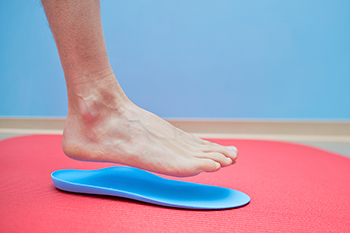
Are you struggling with foot pain, heel issues, or even balance problems? Custom orthotics might be the answer for you. These specially designed insoles are more than just padding. They are medical devices prescribed to treat various foot conditions. If you experience consistent foot or heel pain, have balance issues, or notice uneven shoe wear, it's worth considering orthotics. They are particularly beneficial for patients with conditions like plantar fasciitis, flat feet, or high arches and offer targeted support to relieve pain and improve alignment. Orthotics can also aid in the recovery from lower limb injuries and are often recommended for diabetic foot care. If you want to explore the personal benefits of custom foot orthotics, it is suggested that you make an appointment with a podiatrist. It is not necessary to suffer if these insoles can help you.
If you are experiencing discomfort in your feet and would like to try custom orthotics, contact Anas Khoury, DPM from North Eastern Foot & Ankle Specialists. Our doctor can provide the care you need to keep you pain-free and on your feet.
What Are Custom Orthotics?
Custom orthotics are inserts you can place into your shoes to help with a variety of foot problems such as flat feet or foot pain. Orthotics provide relief and comfort for minor foot and heel pain.
Over-the-Counter Inserts
Shoe inserts come in a wide variety and are used to treat foot pain, heel pain, and minor problems. For example, arch supports can be inserted into your shoes to help correct overarched or flat feet, while gel insoles are often used because they provide comfort and relief from foot and heel pain by alleviating pressure.
Prescription Orthotics
If over-the-counter inserts don’t work for you or if you have a more severe foot concern, it is possible to have your podiatrist prescribe custom orthotics. These high-quality, custom inserts are designed to treat problems such as abnormal motion, plantar fasciitis, and severe forms of heel pain. They can even be used to help patients suffering from diabetes by treating foot ulcers and painful calluses and are usually molded to your feet individually, which allows them to provide full support and comfort.
If you're experiencing minor to severe foot or heel pain, it’s recommended to speak with your podiatrist about the possibility of using custom orthotics or shoe inserts. A podiatrist can determine which type of custom orthotic or shoe insert is right for you and help you take the first steps toward being pain-free.
If you have any questions please contact our office located in Passaic, NJ . We offer the newest diagnostic and treatment technologies for all your foot and ankle needs.
Get Professional Care for a Broken Foot or Ankle
How to Prevent Ingrown Toenails
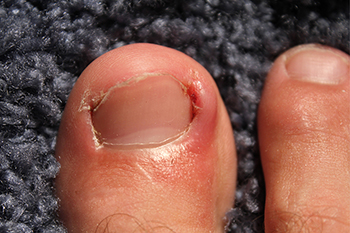
Ingrown toenails can be a painful and bothersome foot condition, but they are often preventable with proper care and understanding of their causes. This troublesome malady occurs when the edge or corner of a toenail grows into the surrounding skin, leading to pain, redness, and potential infection. One common cause of ingrown toenails is improper nail trimming. Cutting the nails too short or rounding the edges can encourage the nail to grow into the skin. Wearing tight or ill-fitting shoes that put pressure on the toes is another contributing factor, as it can force the nail to grow abnormally. To prevent ingrown toenails, it is important to trim the nails straight across and not too short. Wearing well-fitted, comfortable shoes that can provide enough room for your toes may also help to prevent this painful condition. Additionally, maintaining good foot hygiene and protecting your toes can go a long way in preventing the development of ingrown toenails. If you have developed this ailment, it is strongly suggested that you schedule an appointment with a podiatrist as quickly as possible who can offer treatment options that are right for you.
Ingrown toenails may initially present themselves as a minor discomfort, but they may progress into an infection in the skin without proper treatment. For more information about ingrown toenails, contact Anas Khoury, DPM of North Eastern Foot & Ankle Specialists. Our doctor can provide the care you need to keep you pain-free and on your feet.
Ingrown Toenails
Ingrown toenails are caused when the corner or side of a toenail grows into the soft flesh surrounding it. They often result in redness, swelling, pain, and in some cases, infection. This condition typically affects the big toe and may recur if it is not treated properly.
Causes
- Improper toenail trimming
- Genetics
- Improper shoe fitting
- Injury from pedicures or nail picking
- Abnormal gait
- Poor hygiene
You are more likely to develop an ingrown toenail if you are obese, have diabetes, arthritis, or have any fungal infection in your nails. Additionally, people who have foot or toe deformities are at a higher risk of developing an ingrown toenail.
Symptoms
Some symptoms of ingrown toenails are redness, swelling, and pain. In rare cases, there may be a yellowish drainage coming from the nail.
Treatment
Ignoring an ingrown toenail can have serious complications. Infections of the nail border can progress to a deeper soft-tissue infection, which can then turn into a bone infection. You should always speak with your podiatrist if you suspect you have an ingrown toenail, especially if you have diabetes or poor circulation.
If you have any questions, please feel free to contact our office located in Passaic, NJ . We offer the newest diagnostic and treatment technologies for all your foot care needs.
How Foot Protection May Help to Prevents Falls
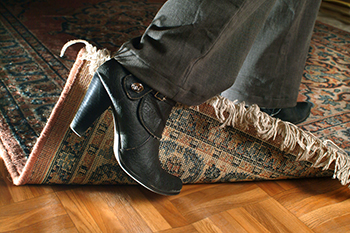
Our feet play a crucial role in maintaining our balance and preventing accidental falls. When it comes to fall prevention, the importance of foot protection is often overlooked. Wearing proper footwear is an essential element in safeguarding against slips, trips, and stumbles. Shoes with slip-resistant soles can provide traction on various surfaces, reducing the risk of sliding. Well-fitting shoes offer stability and support, minimizing the chances of ankle twists or sprains. Additionally, shoes with adequate cushioning can absorb shock and reduce the impact on joints, preventing balance disruptions. Footwear that fits properly and comfortably can help maintain stability and decrease the likelihood of tripping. Whether it is at home, in the workplace, or outdoors, choosing the right shoes for the occasion can make a significant difference in fall prevention, keeping you on your feet and safe. If you would like additional information about the importance of wearing shoes that fit correctly which may help to prevent falling, it is suggested that you contact a podiatrist.
Preventing falls among the elderly is very important. If you are older and have fallen or fear that you are prone to falling, consult with Anas Khoury, DPM from North Eastern Foot & Ankle Specialists. Our doctor will assess your condition and provide you with quality advice and care.
Every 11 seconds, an elderly American is being treated in an emergency room for a fall related injury. Falls are the leading cause of head and hip injuries for those 65 and older. Due to decreases in strength, balance, senses, and lack of awareness, elderly persons are very susceptible to falling. Thankfully, there are a number of things older persons can do to prevent falls.
How to Prevent Falls
Some effective methods that older persons can do to prevent falls include:
- Enrolling in strength and balance exercise program to increase balance and strength
- Periodically having your sight and hearing checked
- Discuss any medications you have with a doctor to see if it increases the risk of falling
- Clearing the house of falling hazards and installing devices like grab bars and railings
- Utilizing a walker or cane
- Wearing shoes that provide good support and cushioning
- Talking to family members about falling and increasing awareness
Falling can be a traumatic and embarrassing experience for elderly persons; this can make them less willing to leave the house, and less willing to talk to someone about their fears of falling. Doing such things, however, will increase the likelihood of tripping or losing one’s balance. Knowing the causes of falling and how to prevent them is the best way to mitigate the risk of serious injury.
If you have any questions, please feel free to contact our office located in Passaic, NJ . We offer the newest diagnostic and treatment technologies for all your foot care needs.
Common Foot Problems
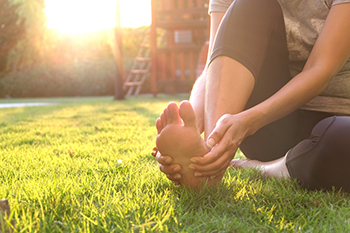
Foot pain is a widespread issue affecting millions of Americans daily. It can hinder your ability to work, socialize, and function effectively. The most commonly reported complaints of foot pain are bunions, flat feet, hammertoes, ingrown toenails, and plantar fasciitis. Bunions are characterized by a painful bump at the base of the big toe. Conservative approaches include wearing roomy shoes, using toe sleeves, and employing toe spacers. In severe cases, minimally invasive surgical options are available. Fallen arches, commonly known as flat feet, can cause chronic pain in the arch, ankle, and leg due to the loss of tendon elasticity. Hammertoes present as claw-like deformities in the toe joint, leading to discomfort, especially when the toe rubs against the shoe. Ingrown toenails occur when a toenail grows into the flesh surrounding it. This can cause extreme pain and can easily become infected, which requires prescribed antibiotic cream or possible nail removal. Plantar fasciitis is known for causing excessive heel pain from tears in the plantar fascia tissue that runs beneath the foot. Addressing foot pain is important for maintaining a high quality of life. Whether opting for conservative or surgical interventions, it is suggested that you make an appointment with a podiatrist to determine the most appropriate treatment plan for your specific foot condition.
Foot Pain
Foot pain can be extremely painful and debilitating. If you have a foot pain, consult with Anas Khoury, DPM from North Eastern Foot & Ankle Specialists. Our doctor will assess your condition and provide you with quality foot and ankle treatment.
Causes
Foot pain is a very broad condition that could be caused by one or more ailments. The most common include:
- Bunions
- Hammertoes
- Plantar Fasciitis
- Bone Spurs
- Corns
- Tarsal Tunnel Syndrome
- Ingrown Toenails
- Arthritis (such as Gout, Rheumatoid, and Osteoarthritis)
- Flat Feet
- Injury (from stress fractures, broken toe, foot, ankle, Achilles tendon ruptures, and sprains)
- And more
Diagnosis
To figure out the cause of foot pain, podiatrists utilize several different methods. This can range from simple visual inspections and sensation tests to X-rays and MRI scans. Prior medical history, family medical history, and any recent physical traumatic events will all be taken into consideration for a proper diagnosis.
Treatment
Treatment depends upon the cause of the foot pain. Whether it is resting, staying off the foot, or having surgery; podiatrists have a number of treatment options available for foot pain.
If you have any questions, please feel free to contact our office located in Passaic, NJ . We offer the newest diagnostic and treatment technologies for all your foot care needs.

